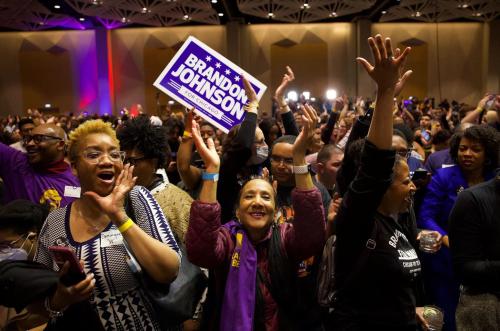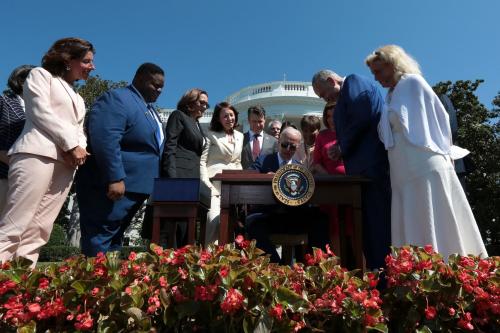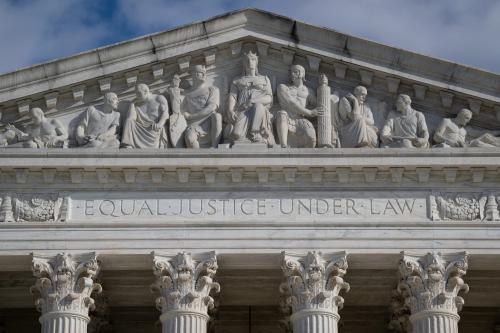When the right to choose an abortion is on the ballot, it wins. And it will keep winning for the rest of the decade until the right to abortion is secured state by state in all but the deepest red states and the U.S. Supreme Court’s decision is rendered moot.
The latest evidence? On Tuesday, the liberal Milwaukee circuit court judge, Janet Protasiewicz, scored a solid victory over the conservative candidate Daniel Kelly in a race whose outcome would determine the majority on the Wisconsin Supreme Court and pave the way for overturning the 1849 law outlawing abortion.
This race is but the latest example of the power this issue has to upend American politics. It happened first in August 2022 when a referendum on the primary ballot in Kansas would have amended the state constitution to make abortion illegal. Turnout was high — more votes were cast (980,000) than in any primary election in Kansas history. In a state Donald Trump won by 15 points, the anti-abortion referendum lost 59% to 41%. The larger more urban counties rejected the referendum by large margins and in the rural counties where it won it won by narrow margins.
And now Wisconsin.
In the 2020 presidential race, Wisconsin was a battleground state where Biden won a narrow victory (just over 20,000 votes) over Trump. The race for the open Supreme Court seat broke all records for turnout and money spent. Turnout appears to be 1.8 million — over half of the turnout in the 2020 presidential election. Over $45 million was spent according to WisPolitics — “a stunning sum for a statewide, off-year, springtime election.” The campaigning was intense, complete with nearly half of the ads about abortion.
As the race went on, Dan Kelly, the conservative candidate with a pro-life record, tried to change the subject and tamp down the abortion issue; realizing as the race progressed (as did others in the 2022 midterms) — that his stance was a loser.
As in Kansas, the power of the abortion issue is evident when compared to the presidential vote county by county. In the state’s two most populous counties, Milwaukee and Dane (home to the University of Wisconsin in Madison) Protasiewicz won big, which was to be expected. However, she also exceeded Biden’s vote in those two places — by 3.6% in Milwaukee and 6.3% in Dane. In the state’s next three most populous counties Biden lost to Trump, but in each one Protasiewicz performed better than Biden. In the third largest county in the state, Wausheka, Biden won 38.9% of the vote but Protasiewicz won 42%. In Brown County Biden won 45.6% of the vote but Protasiewicz won 52%. And in Racine County Biden won 47.2% of the vote and Protasiewicz won 49%.
As we saw in the 2022 midterms — when the freedom to choose is on the ballot it wins — upending prior voting patterns. The issue today is more real than it was in past races where Democrats always tried to argue its importance. Not surprising. A right withdrawn will always get more attention than a right taken for granted. While we don’t have any exit polls to confirm that abortion was foremost in voters’ minds, the explicit prominence of the issue in Protasiewicz’s campaign and Kelly’s failed attempts to change the topic are evidence that there was one big issue in this race.
In the coming years pro-choice advocates will try to put as many pro-choice referenda on the ballot as possible. In 2022, six states had referenda on the ballot and the pro-choice position won in all of them. Wisconsin’s attempt at a referenda was rejected, but the recent Supreme Court race took its place and victory there will likely accomplish the same thing. In 2024 we can expect at least ten states to have citizen-led ballot initiatives enshrining abortion rights in their state constitutions.[1]
The strength of the pro-choice position goes well beyond the debate over abortion itself. Deep in the American DNA is the belief that we should have as little government and as much liberty as possible. The law’s intrusion into the complex medical and moral issues surrounding as personal a decision as abortion strikes at the heart of American’s desires to control their own destiny. All indications are that by the end of the decade the Supreme Court’s decision to return abortion rights to states will reinstate abortion across the land.
[1] Arizona, Arkansas, Florida, Missouri, Montana, Nebraska, North Dakota, Ohio, Oklahoma and South Dakota.
The Brookings Institution is committed to quality, independence, and impact.
We are supported by a diverse array of funders. In line with our values and policies, each Brookings publication represents the sole views of its author(s).








Commentary
The right to abortion will be secured before the end of the decade
April 5, 2023